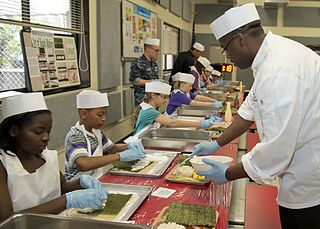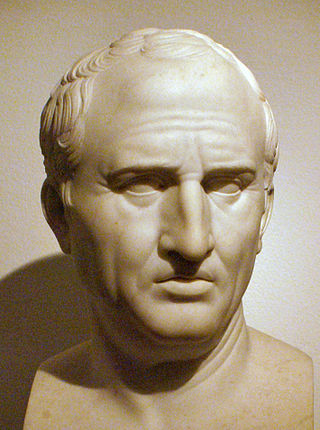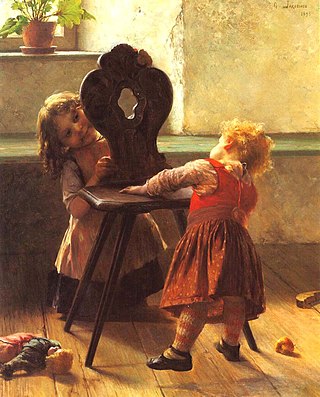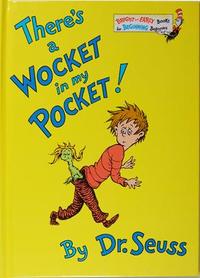Related Research Articles
The mnemonic peg system, invented by Henry Herdson, is a memory aid that works by creating mental associations between two concrete objects in a one-to-one fashion that will later be applied to to-be-remembered information. Typically this involves linking nouns to numbers and it is common practice to choose a noun that rhymes with the number it is associated with. These will be the pegs of the system. These associations have to be memorized one time and can be applied repeatedly to new information that needs to be memorized.

Learning is the process of acquiring new understanding, knowledge, behaviors, skills, values, attitudes, and preferences. The ability to learn is possessed by humans, non-human animals, and some machines; there is also evidence for some kind of learning in certain plants. Some learning is immediate, induced by a single event, but much skill and knowledge accumulate from repeated experiences. The changes induced by learning often last a lifetime, and it is hard to distinguish learned material that seems to be "lost" from that which cannot be retrieved.

Pig is a simple, collecting card game of early 20th century American origin suitable for three to thirteen players that is played with a 52-card French-suited pack. It has two very similar and well known variants – donkey and spoons. It is often classed as a children's game. It may be descended from an old game called vive l'amour.
I spy is a guessing game where one player chooses an object within sight and announces to the other players that "I spy with my little eye something beginning with...", naming the first letter of the object. Other players attempt to guess this object. It is often played as a car game.
Car games are games played to pass the time on long car journeys, often started by parents to amuse restless children. They generally require little or no equipment or playing space. Some such games are designed specifically to be played while traveling, while others are games that can be played in a variety of settings including car journeys.

A parlour or parlor game is a group game played indoors, named so as they were often played in a parlour. These games were extremely popular among the upper and middle classes in the United Kingdom and in the United States during the Victorian era.

Tag is a playground game involving one or more players chasing other players in an attempt to "tag" and mark them out of play, typically by touching with a hand. There are many variations; most forms have no teams, scores, or equipment. Usually when a person is tagged, the tagger says, "It!" or "Tag, you're 'It'!" The last one tagged during tag is "It" for the next round. The game is known by other names in various parts of the world, including "running and catching" in India and "catch and cook" in the Middle East.
The Letter People is a children's literacy program. The term also refers to the family of various characters depicted in it.

Teabagging is a slang term for the sexual act involving placing the scrotum into the mouth of a sexual partner for sexual pleasure, or onto the face or head of another person, sometimes as a comedic device.
Second-language acquisition (SLA), sometimes called second-language learning—otherwise referred to as L2acquisition, is the process of learning a language other than one's native language (L1). SLA research examines how learners develop their knowledge of second language, focusing on concepts like interlanguage, a transitional linguistic system with its own rules that evolves as learners acquire the target language.

The method of loci is a strategy for memory enhancement, which uses visualizations of familiar spatial environments in order to enhance the recall of information. The method of loci is also known as the memory journey, memory palace, journey method, memory spaces, or mind palace technique. This method is a mnemonic device adopted in ancient Roman and Greek rhetorical treatises. Many memory contest champions report using this technique to recall faces, digits, and lists of words.

Peekaboo is a form of play played with an infant. To play, one player hides their face, pops back into the view of the other, and says Peekaboo!, sometimes followed by I see you! There are many variations: for example, where trees are involved, "Hiding behind that tree!" is sometimes added. Another variation involves saying "Where's the baby?" while the face is covered and "There's the baby!" when uncovering the face.

Kim's Game is a game or exercise played by Scouts, the military, and other groups, in which a selection of objects must be memorised. The game develops a person's capacity to observe and remember details. The name is derived from Rudyard Kipling's 1901 novel Kim, in which the protagonist plays the game during his training as a spy.
Ringolevio is a children's game which originated in the streets of New York City, where it is known to have been played at least as far back as the late 19th century. It is one of the many variations of tag. In Canada, the game is known as Relievio, a name which was also used in Boston and Ireland in the 1950s. It is also, in some places, known as coco-levio.

There's a Wocket in My Pocket! is a short children's book by Dr. Seuss, published by Random House in 1974. It features a little boy talking about the strange creatures that live in his house, such as the yeps on the steps, the nooth grush on his toothbrush, the wasket in his basket, the zamp in a lamp, the yottle in the bottle, and the Nureau in the bureau.

Reading is the process of taking in the sense or meaning of symbols, often specifically those of a written language, by means of sight or touch.
In the Dungeons & Dragons fantasy role-playing game, a magic item is any object that is imbued with magic powers. These items may act on their own or be the tools of the character possessing them. Magic items have been prevalent in the game in every edition and setting, from the original edition in 1974 until the modern fifth edition. In addition to jewels and gold coins, they form part of the treasure that the players often seek in a dungeon. Magic items are generally found in treasure hoards, or recovered from fallen opponents; sometimes, a powerful or important magic item is the object of a quest.
Here Comes an Old Soldier from Botany Bay, commonly known as Here Comes an Old Soldier or just Old Soldier, is a nursery rhyme and children's game found in Australia, the United States, and the British Isles. The game and rhyme date to at least the late nineteenth century.
Theatre in education (TIE), originating in Britain in 1965, is the use of theatre for purposes beyond entertainment. It involves trained actors/educators performing for students or communities, with the intention of changing knowledge, attitudes, and behaviour. Canadian academics Monica Prendergast and Juliana Saxton describe TIE as "one of the two historic roots of applied theatre practice".
References
- ↑ Brandreth, Gyles. Everyman's word games. Dent. ISBN 0460047116.
- ↑ Jack McGuire (1990). Hopscotch, Hangman, Hot Potato, & Ha Ha Ha: A Rulebook of Children's Games . Simon & Schuster. p. 68. ISBN 0671763326.
- ↑ Cohen, Vicki; Cowen, John (2007). Literacy for Children in an Information Age: Teaching Reading, Writing, and Thinking. Cengage Learning. p. 334. ISBN 978-0534611194.
- ↑ Parlett, David. The Penguin book of word games. Penguin Books. p. 53. ISBN 0140056866.
- ↑ Wallace, Gerald; Kauffman, James M. (1973). Teaching Children with Learning Problems. Merrill. ISBN 978-0-675-08998-2.
- ↑ Dynes, Robin (2017-07-05). The Memory Handbook: Strategies and Activities to Aid Memory. Taylor & Francis. p. 161. ISBN 978-1-351-69800-9.
- ↑ Lauchlan, Fraser; Carrigan, Donna (2013-03-28). Improving Learning through Dynamic Assessment: A Practical Classroom Resource. Jessica Kingsley Publishers. p. 45. ISBN 978-0-85700-731-5.